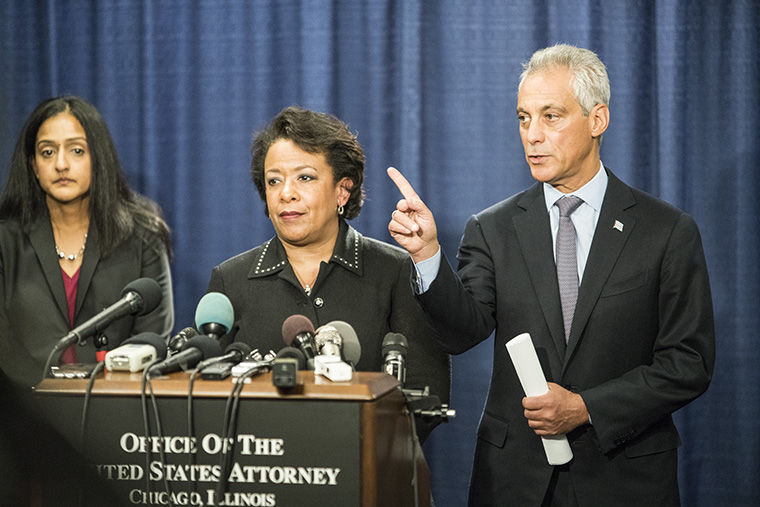Emanuel, Johnson address ‘sobering’ DOJ findings
January 13, 2017
Lack of police accountability, transparency and de-escalation tactics and training are some of the most contentious topics of debate within law enforcement and the communities they police across the country.
On Jan. 13, the U.S. Department of Justice along with U.S. Attorney General Loretta Lynch released their report, which accused CPD of violations of the civil rights of Chicagoans.
Mayor Rahm Emanuel and CPD Superintendent Eddie Johnson held a press conference at Everett McKinley Dirksen Courthouse, 219 S. Dearborn St., the same day to comment on the report and assure citizens it would be taken seriously.
“The incidents described in this report are sobering to all of us,” Emanuel said.
Chicago became a national example of police brutality and violence after police dash-cam footage of the fatal shooting of 17-year-old Laquan McDonald by Chicago police officer Jason Van Dyke was released in November 2015.
The release of the footage resulted in protests calling for various reforms including the resignation of Emanuel, as reported Nov. 30, 2016 by The Chronicle, and a yearlong investigation of the Chicago Police Department by the DOJ.
A common criticism of CPD by locals and social justice organizations, such as the Chicago Alliance Against Racist and Political Reform, is how accusations of police misconduct are handled.
During the speech, Emanuel noted that the city has already taken steps to address this with the replacement of the Independent Police Review Authority with the Civilian Office of Police Accountability, as reported Oct. 10, 2016 by The Chronicle.
“[CPD] and the City of Chicago is already on the road to reform, and there are no U-turns on that road,” Emanuel said.
Emanuel said police misconduct damages the individuals affected and the reputation of CPD because incidents of misconduct represent only a small percent of police officers.
“I believe firmly [the report] does not represent the good work of the vast majority of the men and women of the [CPD],” Emanuel said. “I am confident any wrongdoing cited in this report can be solved by what most Chicago police officers are doing right.”
Johnson echoed Emanuel’s statements and added critical reform in accountability and de-escalation training have been implemented and will only become stronger in the future.
According to Johnson, CPD has become more transparent than ever through policies like the new Use of Force policy, which was open for public input, as reported Dec. 5, 2016 by The Chronicle. He added every patrol officer will be equipped with a body camera by 2018, as reported Sept. 26, 2016 by The Chronicle.
Johnson said it would take time to objectively and effectively implement the reforms needed to regain the trust of the community.
“Despite this progress, it is important to recognize that the challenges we face will not be fixed overnight,” Johnson said. “It will take a sustained effort over time to achieve the systemic reforms that are necessary.”
Emanuel urged people to be cooperative and to work together with the city and CPD to achieve these goals.
“When it comes to reducing gun violence and crime, there is no us versus them,” Emanuel said. “We are one Chicago with one goal.”








